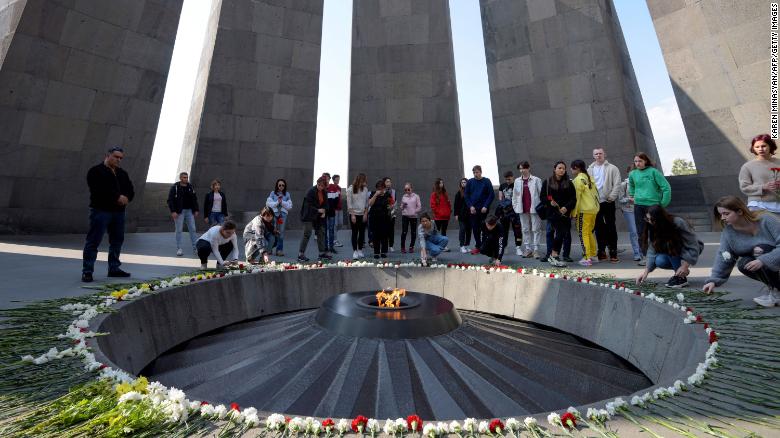Trump administration won’t call mass killing of Armenians a genocide despite congressional resolutions
Jennifer Hansler, CNN/December 18/2019
ترمب يرفض الاعتراف بالابادة الجماعية للارمن… بعد تهديد من اردوغان/يتحدى قرارا مدعوما من الجمهوريين والديموقراطيين في مجلس الشيوخ
كريس ميندوك/انيبندت عربية/18 كانون الأول/2019
رفضت إدارة الرئيس الأميركي دونالد ترمب قراراً صادراً عن مجلس الشيوخ يعترف بالإبادة الجماعية للأرمن، بعد يومٍ واحد من تهديد الرئيس التركي رجب طيّب أردوغان بالردّ عِبْرَ الاعتراف بمسألة قتل الأميركيّين الأصليّين في الولايات المتّحدة على يد الأوروبيّين الذي هاجروا إلى أميركا.
واعترضت وزارة الخارجية الأميركية على الإجراء الذي أقدم عليه مجلس الشيوخ يوم الثلاثاء الماضي، عندما أكّدت ناطقة بإسمها أن الموقف الرسمي في هذا الشأن لم يتغيّر. وذكرت المتحدّثة مورغان أورتيغوس في تصريح لها إن “موقف الإدارة لم يتغّير. وتتجسّد وجهات نظرنا في البيان النهائي للرئيس الأميركي في شأن تلك القضية، الصادر في إبريل (نيسان) الماضي”.
وفي الأسبوع الماضي، أصدر مجلس الشيوخ الأميركي قراراً بالإجماع، يعترف بالإبادة الجماعية للأرمن واعتبر الأمر مسألة تتعلّق بالسياسة الخارجية للبلاد، وذلك في مظهر نادر للتوافق بين الحزبين “الجمهوري” والديموقراطي” في ما يتعلّق بقضية مثيرة جدّاً للخلاف، على الرغم من الاعتراضات التي أبدتها إدارة الرئيس دونالد ترمب. ويعتبر ذلك المرّة الأولى التي يحدّد فيها الكونغرس الأميركي رسمياً أعمال القتل التي وقعت في 1915 وحصدت ما يُقدّر بنحو مليون ونصف المليون أرمني على يد الأمبراطورية العثمانية، بأنها “إبادة جماعية”. واعتبر السيناتور روبرت مينينديز “الديموقراطي” عن ولاية نيوجيرزي، الذي شارك في رعاية التشريع إلى جانب السيناتور “الجمهوري” عن ولاية تكساس تيد كروز، في خطاب طغت عليه لحظات عاطفية قبل إقرار التشريع، أن “التغاضي عن المعاناة الإنسانية ليس من القيم التي نمثلها كأمّة…. نحن أفضل من ذلك، وسياستنا الخارجية يجب أن تعكس دائماً هذا المنحى”.
ويأتي تصويت مجلس الشيوخ الأميركي بعد موافقة مجلس النوّاب على الإجراء نفسه الشهر الماضي، في تصويتٍ تزامن مع اجتماع دونالد ترمب مع الرئيس التركي إردوغان في المكتب البيضاوي في البيت الأبيض. وقد هدّد إردوغان على أثر تصويت مجلس الشيوخ الأسبوع الماضي، بالاعتراف بقضية قتل أميركيّين أصليّين في أميركا على يد المستوطنين الأوروبيّين، أثناء دخولهم إلى جميع أنحاء البلاد وتهجير جميع سكّانها وقتلهم. وقال إردوغان في مقابلة مع قناة “إي هابر” الإخبارية الموالية للحكومة التركية إنه “يجب أن نواجه الولايات المتحدة بقراراتٍ مماثلة في البرلمان. وهذا ما سنفعله”. وأضاف متسائلاً، “هل يمكن أن نتحدّث عن أميركا من دون ذكر الأميركيّين الأصليّين؟ إنها لحظةٌ مخزية في تاريخ الولايات المتّحدة”.
وفي السياق نفسه، أعادت وزارة الخارجية الأميركية التذكير بتعليقات الرئيس ترمب في الرابع والعشرين من إبريل (نيسان) الماضي، التي صدرت عنه في “الذكرى العالمية لضحايا الأرمن”. وقد اعترف ترمب في تصريحاته بأن أكثر من مليون ونصف مليون أرمني “جرى ترحيلهم أو ذبحهم أو سيقوا إلى حتفهم” تحت حكم الإمبراطورية العثمانية. ولم يصف ترمب الأحداث بأنها إبادة جماعية. وفيما اعترف سلفه الرئيس السابق باراك أوباما عندما كان مرشّحاً لرئاسة في العام 2008 بأن تلك الأحداث كانت إبادة جماعية، إلا أن إدارته [اوباما] عادت وأكّدت في وقتٍ لاحق لحكومة أنقرة أنها لا تؤيّد قراراً رسمياً يعترف بتلك الجرائم بوصفها إبادة جماعية.© The Independent
Trump administration won’t call mass killing of Armenians a genocide despite congressional resolutions
Jennifer Hansler, CNN/December 18/2019
(CNN)The Trump administration still does not view the mass killing of Armenians from 1915-1923 as genocide, despite overwhelming bipartisan support by US lawmakers to formally recognize it as such. In a statement released Tuesday, State Department spokesperson Morgan Ortagus said the administration has not changed its position on the matter. “Our views are reflected in the President’s definitive statement on this issue from last April,” Ortagus said. In that statement, which commemorated “Armenian Remembrance Day,” President Donald Trump called the massacre of Armenians by the Ottoman Empire that took place from 1915 to 1923 “one of the worst mass atrocities of the 20th century.”
“We pledge to learn from past tragedies so as to not to repeat them. We welcome the efforts of Armenians and Turks to acknowledge and reckon with their painful history,” Trump said in the statement. The statement did not mention genocide, but did recognize the man who coined the term — Raphael Lemkin — for his work seeking “to ensure atrocities like this would not be repeated.” Last week, the Senate passed a resolution to designate the mass killings as a genocide, describing it as “the killing of an estimated 1,500,000 Armenians by the Ottoman Empire from 1915 to 1923.” It passed by unanimous consent after Sen. Bob Menendez of New Jersey, the top Democrat on the Senate Foreign Relations Committee, brought it up for consideration on the floor. Under Senate rules, legislation can pass by unanimous consent without a roll call vote as long as no senator objects. Prior to its passage, the Trump administration had asked Republican senators to block the unanimous consent request several times on the grounds that it could undercut negotiations with Turkey. The House of Representatives passed the resolution recognizing the genocide in October.
The approval of the resolution drew outrage from Turkey, which denies that the events of 1915 that led to the mass killing of Armenians constitute a genocide. The Turks contend that closer to 300,000 Armenians were killed. In a statement, the Turkish Ministry of Foreign Affairs called the resolution “devoid of historical awareness and any legal base” and damaging to US-Turkey relations. On Friday, US Ambassador to Turkey David Satterfield was summoned by the Foreign Ministry over the passage of the resolution. On Sunday, Turkish President Recep Tayyip Erdogan threatened to close, “if necessary,” two US military bases in Turkey in response to the genocide resolution and potential US sanctions over his country’s purchase of the Russian S-400 missile system. In a televised interview, Erdogan called the resolution “completely political,” and warned the US “not take irreparable steps in our relations.”
CNN’s Clare Foran, Phil Mattingly and Jonny Hallam contributed to this report.






















